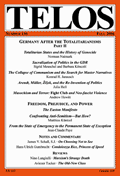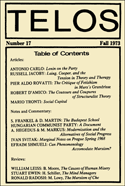By Telos Press · Wednesday, August 22, 2012 Religion and Politics in a Post-Secular World
The Seventh Annual Telos Conference
February 16-17, 2013
New York City
The 21st century has been marked by both events and reflections that have explicitly challenged the long-standing liberal project of maintaining a separation between religion and politics. Not only have political conflicts become inseparable from theological and metaphysical considerations, but standard liberal claims of value-neutrality have been undermined by insights into the theological presuppositions of secular institutions. The goal of the 2013 Telos Conference will be to investigate the changing relationship between religion and politics. Possible topics include secularization and the “post-secular” turn; the theological foundations of political systems such as liberalism, socialism, and fascism; political theology; religion and the public sphere; separation of church and state; new civil forms of religious practice; the politics of religious pluralism; myth and sovereignty; theology and modernity; religion and political values; theocracy and religious law.
Please send short cv, paper title, and a 200-word abstract for a 15-minute presentation to David Pan (dtpan@uci.edu) with “2013 Telos Conference” in subject line by October 15, 2012.
Let’s say you’re invited to make a savory but unusual choice. Each night, you may get a fine four-course steak dinner from a drive-thru and eat it in your car on the way home. Or, you may elect to have burgers at home in the company of your family and friends. Taken alone, the four-course dinner may be more delicious and more nutritive, unquestionably the better assortment of consumable items. But is the meal better? Meal begins to sound like an ambiguous term. What do we mean by meal? Is a meal a social experience or an object we consume? These days we are asking the same of university classes.
There is no hotter topic in higher education today than online learning. This summer, online courses helped fuel a firestorm at our own University of Virginia. The Board of Visitors offered several vague reasons for President Teresa Sullivan’s ouster, but one rang clear enough: in the rector’s eyes, UVa had fallen behind its peer institutions by failing to develop a greater online presence. Since Sullivan’s reinstatement, the administration has rushed to show that this is not the case. The University recently announced that it would join peer institutions like Berkeley, Michigan, Princeton, and Stanford in offering free online classes through Coursera.
Continue reading →
By Nassim Benchaabane · Monday, August 20, 2012 As an occasional feature on TELOSscope, we highlight a past Telos article whose critical insights continue to illuminate our thinking and challenge our assumptions. Today, Nassim Benchaabane looks at James V. Schall’s “On Choosing Not to See” from Telos 136 (Fall 2006).
 Two tourists happen upon a waterfall on the order of Niagara. One describes it as “sublime,” the other as “pretty,” but “pretty” is the wrong description. This scenario, from a passage in C.S. Lewis’s The Abolition of Man, is not merely about the proper use of words. It poses a more serious question, a question of objective reality, and it weighs heavily not only on philosophical studies such as epistemology, metaphysics, and ontology, but also on life in general. This is the powerful question at the heart of James V. Shall’s “On Choosing Not to See,” a profound and expertly written article that carries a controversial declaration: modern society, often a constructed alternate to the truth of what is, is gripped by our power to choose “not to see.” Two tourists happen upon a waterfall on the order of Niagara. One describes it as “sublime,” the other as “pretty,” but “pretty” is the wrong description. This scenario, from a passage in C.S. Lewis’s The Abolition of Man, is not merely about the proper use of words. It poses a more serious question, a question of objective reality, and it weighs heavily not only on philosophical studies such as epistemology, metaphysics, and ontology, but also on life in general. This is the powerful question at the heart of James V. Shall’s “On Choosing Not to See,” a profound and expertly written article that carries a controversial declaration: modern society, often a constructed alternate to the truth of what is, is gripped by our power to choose “not to see.”
Continue reading →
By Wes Tirey · Thursday, August 16, 2012 Democratic theorists everywhere should be gushing—to some extent, at least—over the current Chick-fil-a controversy. While it is by no means an isolated instance of disagreement in the United States, it nonetheless displays in a public fashion the dissensus that is so central to the concept of democracy itself.
Democracy is inherently dialectical. That is, it is borne out of a tension that endeavors toward particular ends, such as liberty, equality, and autonomy. As its own kind of regime or regimes, the people (demos) of a democracy are to wield the power (kratos) that ultimately defines and renews the institutions they live under and the laws to which they are subject. This of course requires the organization of regimes within the public sphere to display their dissent or disagreement openly and freely.
Continue reading →
By Frederick H. Pitts · Monday, August 13, 2012 As an occasional feature on TELOSscope, we highlight a past Telos article whose critical insights continue to illuminate our thinking and challenge our assumptions. Today, Frederick H. Pitts looks at Mario Tronti’s “Social Capital” in Telos 17 (Fall 1973). An earlier post on Tronti’s critique of trade unionism appeared on Friday.
 In a previous post, I discussed Tronti’s critique of trade unionism. Here I investigate the suggestions Tronti offers as to how the complete integration of organized labor within the capitalist system can be surpassed in order to erect an effective working-class challenge against capitalist domination. Tronti begins his piece “Social Capital” by outlining the way in which fully developed capitalism witnesses the all-encompassing socialization of the class relation. The unorthodox and controversial appeal of Tronti’s text consists precisely in the way in which he treats class struggle not as some external hazard facing capitalism, but as an integral part of its operation as a system. The class struggle, far from posing a threat to capital, becomes a constitutive part of its reproduction, maintaining the collective capitalist and collective workers as clearly demarcated and, crucially, organized participants in the continuing success of the system. Trade unions, for Tronti, perform the valuable role of organizing workers as a working class so that they can assume their position in capitalist production. In a previous post, I discussed Tronti’s critique of trade unionism. Here I investigate the suggestions Tronti offers as to how the complete integration of organized labor within the capitalist system can be surpassed in order to erect an effective working-class challenge against capitalist domination. Tronti begins his piece “Social Capital” by outlining the way in which fully developed capitalism witnesses the all-encompassing socialization of the class relation. The unorthodox and controversial appeal of Tronti’s text consists precisely in the way in which he treats class struggle not as some external hazard facing capitalism, but as an integral part of its operation as a system. The class struggle, far from posing a threat to capital, becomes a constitutive part of its reproduction, maintaining the collective capitalist and collective workers as clearly demarcated and, crucially, organized participants in the continuing success of the system. Trade unions, for Tronti, perform the valuable role of organizing workers as a working class so that they can assume their position in capitalist production.
Continue reading →
By Frederick H. Pitts · Friday, August 10, 2012 As an occasional feature on TELOSscope, we highlight a past Telos article whose critical insights continue to illuminate our thinking and challenge our assumptions. Today, Frederick H. Pitts looks at Mario Tronti’s “Social Capital” in Telos 17 (Fall 1973). A second post on Tronti’s article will follow on Monday.
 The labor movement is in crisis, with trade union density falling and its political parties increasingly discredited by their complicity with capitalist austerity programs. New fronts of anti-capitalist activity have been opened, away from the traditional structures of socialism and working-class organization, including the trade unions and the parties of labor. Mario Tronti’s article “Social Capital,” from 1973, presents a critique of trade unionism that possesses significant contemporary relevance in the light of these developments. Tronti presents trade unions as a central element in the capitalist regulation and organization of workers. The fatally compromised nature of trade unions under capital points the way toward different means of building struggles based not upon the maintenance of a status within society as “workers” but along alternative matrices of identity. An example is the Occupy movement’s clarion call of the 99% stacked against capital. The labor movement is in crisis, with trade union density falling and its political parties increasingly discredited by their complicity with capitalist austerity programs. New fronts of anti-capitalist activity have been opened, away from the traditional structures of socialism and working-class organization, including the trade unions and the parties of labor. Mario Tronti’s article “Social Capital,” from 1973, presents a critique of trade unionism that possesses significant contemporary relevance in the light of these developments. Tronti presents trade unions as a central element in the capitalist regulation and organization of workers. The fatally compromised nature of trade unions under capital points the way toward different means of building struggles based not upon the maintenance of a status within society as “workers” but along alternative matrices of identity. An example is the Occupy movement’s clarion call of the 99% stacked against capital.
Continue reading →
|
|
 Two tourists happen upon a waterfall on the order of Niagara. One describes it as “sublime,” the other as “pretty,” but “pretty” is the wrong description. This scenario, from a passage in C.S. Lewis’s The Abolition of Man, is not merely about the proper use of words. It poses a more serious question, a question of objective reality, and it weighs heavily not only on philosophical studies such as epistemology, metaphysics, and ontology, but also on life in general. This is the powerful question at the heart of James V. Shall’s “On Choosing Not to See,” a profound and expertly written article that carries a controversial declaration: modern society, often a constructed alternate to the truth of what is, is gripped by our power to choose “not to see.”
Two tourists happen upon a waterfall on the order of Niagara. One describes it as “sublime,” the other as “pretty,” but “pretty” is the wrong description. This scenario, from a passage in C.S. Lewis’s The Abolition of Man, is not merely about the proper use of words. It poses a more serious question, a question of objective reality, and it weighs heavily not only on philosophical studies such as epistemology, metaphysics, and ontology, but also on life in general. This is the powerful question at the heart of James V. Shall’s “On Choosing Not to See,” a profound and expertly written article that carries a controversial declaration: modern society, often a constructed alternate to the truth of what is, is gripped by our power to choose “not to see.”  In a
In a 

